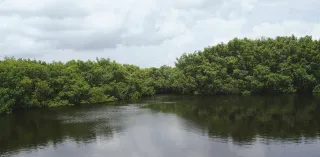Active banners: 0 Visible banners: 0
As Seagrass Habitats Decline, Florida Manatees Die of Starvation
Provided by: NPR |Published on: April 27, 2021
Articles/Websites
6789101112
Synopsis
- This NPR article and short podcast discuss the poor health of the Indian River Lagoon in Florida and the declining local manatee population.
- The lagoon's health has been suffering from increased pollution, which leads to algae blooms that kill the manatees' food source, seagrass.
- The podcast summarizes the article and has a written transcript that is accessible by clicking the paragraph icon in the podcast bar.

Subjects: Biology
Authors: Greg Allen
Region: North America, USA - South, United States, Florida
Languages: English
Teaching Materials
Positives
- This article and podcast use statements from multiple sources to create a clear and concise argument.
- This resource has links to additional information that support the claims that are made and give more details.
- There is a focus on biodiversity, the importance of conservation, and solutions to the problem.
Prerequisites
- There is a strong focus on biodiversity and how ecosystems can be damaged, so students should be familiar with the concepts of "algae super blooms" and "estuaries."
Differentiation & Implementation
- This would be a great resource to use in a biology class when learning about ecosystems and food chains.
- Parallels can be made to other unique ecosystems, and this resource could be used to start a conversation about the unique ecosystems in other parts of the country or globe.
- Some other related resources are Estuary and Marine Monitoring Manual and The Solution to Climate Change Is All Around Us.
Scientist Notes
Teaching Tips
Standards
Resource Type and Format
All resources can be used for your educational purposes with proper attribution to the content provider.
Teaching Materials
Educator Support
My Account







